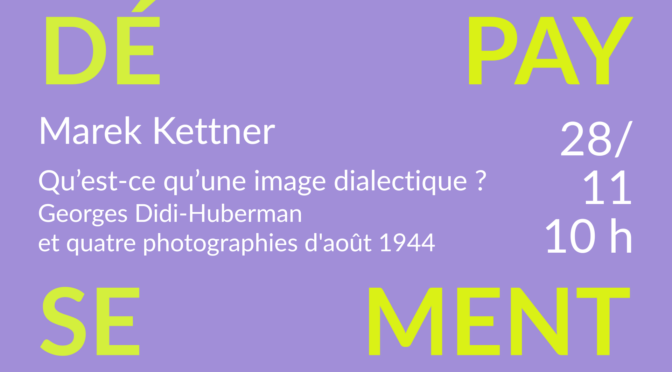
Georges Didi-Huberman and four photographs from August 1944
Second session of the 2025-2026 CEFRES Francophone
Interdisciplinary Seminar “Dépaysements”: Clues and Trajectories.
In 2023 we started questionning the very act of bordering and representing (a territory, a period, a trajectory). In short, thanks to the interdisciplinarity of our respective disciplines, we began inquiring into the question of the map and the border.
Location: CEFRES, Na Florenci 3, Prague 1
Date: Friday November 28, 2025, from 10 am
Language: French
Speaker: Marek KETTNER (University of Pilsen)
Discussant: Fedora PARKMANN (Institute of Art History of the Czech Academy of Sciences / associated at CEFRES)
Abstract
Georges Didi-Huberman conceived of imagination as a montage of images creating complex dialectical images. In his book Images malgré tout (Images Despite Everything), he explores the history of four exceptional photographs of Auschwitz. At the time of writing, these visual traces of the Holocaust are opening up to new interpretations, thanks to new testimonies and archival discoveries, in which imagination plays an essential role. According to the author, there is no historical knowledge without imagination. But imagination alone cannot function without visual traces, understood here as singular moments in a temporal process which cannot be recovered. While it is not possible to reconstruct historical events, it is nevertheless possible to construct dialectical images, montages of individual visual traces that present a given event in a new, often surprising light. With his concept of the dialectical image, Didi-Huberman follows in the footsteps of Walter Benjamin, although differs from him on essential points, as is perhaps best illustrated in his book Images malgré tout.
See the complete program of the 2025-2026 seminar here.
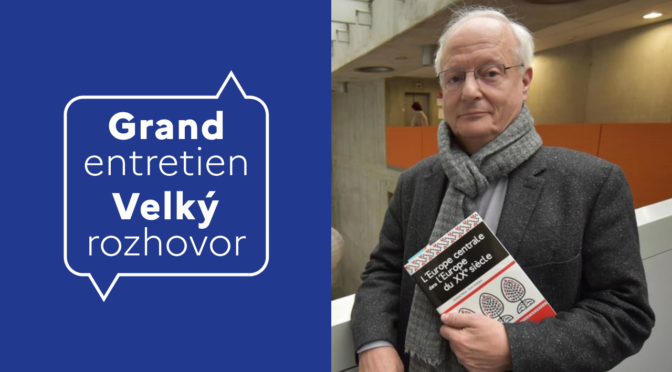
Marcel Aymonin, a Czech passion
On the occasion of the publication of Trajectoire déconcertante entre Dijon, Prague et Paris (1911-1984) (Eur’Orbem, 2025), CEFRES & the French Institute in Prague invite you to a Great Interview with the author Antoine Marès.
When: Wednesday, October 22, 2025, 6 pm
Location: French Institute in Prague, Štěpánská 35, Prague 1
Language: French with simultaneous Czech interpretation
Moderator: poet, director and writer Bertrand SCHMITT
Continue reading Grand entretien with Antoine Marès →
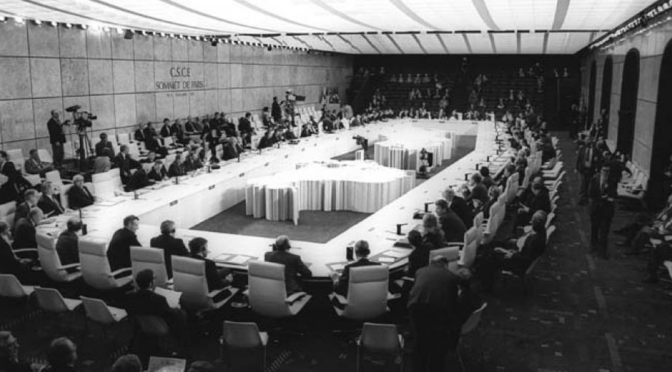
Human Rights, Peace, and Security in Europe in the Perspective of Political Exile as a Non-State Actor in International Politics
This event is organised by the Institute of Contemporary History of the Czech Academy of Sciences in cooperation with CEFRES.
Date: October 21–23, 2025
Location: Archive of Parliament of the Czech Republic (Komunardů 1634/44, Prague 7)
Language: English
This year, we commemorate the 50th anniversary of the signature of the Helsinki Accords and the launch of the Helsinki Process, which significantly changed the political situation in Europe, leading to the collapse of the Eastern Bloc from 1989 to 1991. Through follow-up meetings of the Conference on Security and Cooperation in Europe (CSCE), many government representatives and non-governmental organizations in the West could criticize the undemocratic regimes in the East, particularly for their violations of human and civic rights. Alongside politicians, intellectuals, media, and human rights organizations engaged in the Helsinki Process and worked together with dissidents from the other side of the Iron Curtain. An important but so far unheeded actor was the political and cultural multi-generational exile from Central and Eastern Europe. These exile groups possessed political, cultural, and social capital to affect the Western political public in favor of their interpretation of the Helsinki Process. Moreover, the exiles were the essential mediators between the West and the dissidents in their homelands as they secured communication, information transfer, and material support in both directions.
Program
Continue reading Helsinki at 50. Human Rights, Peace, and Security →
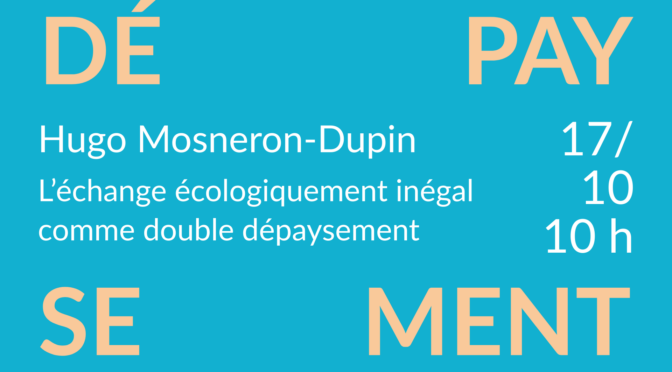
First session of the 2025-2026 CEFRES Francophone
Interdisciplinary Seminar “Dépaysements”: Clues and Trajectories.
In 2023 we started questionning the very act of bordering and representing (a territory, a period, a trajectory). In short, thanks to the interdisciplinarity of our respective disciplines, we began inquiring into the question of the map and the border.
Location: CEFRES, Na Florenci 3, Prague 1
Date: Friday October 17, 2025, from 10 am
Language: French
Speaker: Hugo MOSNERON-DUPIN (Doctor candidate in Economic Philosophy at the ENS – PSL & the CIRED)
Discussant: Jan MARŠÁLEK (FLÚ AVČR)
Abstract
The concept of ecologically unequal exchange seeks to substantiate critical theories of development by highlighting the environmental and territorial consequences of wealth inequalities between countries. To theories of unequal exchange that attempt to explain why certain economies are stuck in a model of exporting low value-added goods, they add a physical rather than economic assessment of these international exchanges: the most developed countries drain the natural resources, particularly energy resources, of the least developed countries, while capturing a portion of these territories and dedicating it to the export economy. Hence the notion of ecologically unequal exchange allows us to examine dépaysement in two ways: firstly, exporting constitutes a literal displacement, a transfer beyond the borders of an entity that carries with it a dimension – in this case, an ecological one – of its country of origin; secondly, the transformation of a territory to produce goods that will be sold abroad can be considered as a displacement not only of goods but of the producing territory itself. Indeed, the theory of ecologically unequal exchange shows that these territories can be considered as ecological enclaves of the importing country within the exporting country. We will conduct these reflections based on a comparative reading of Underdeveloping the Amazon (Stephen Bunker, 1987) – the seminal work on this approach – and a concrete study of ecologically unequal exchange on intensive shrimp farming in Ecuador by ecologist Howard Odum (1991).
See the complete program of the 2025-2026 seminar here.
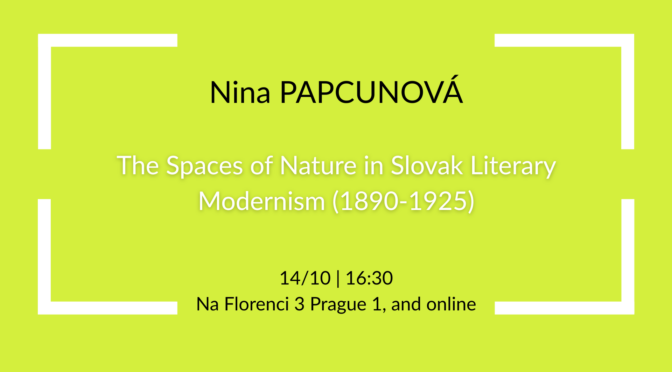
2nd session of CEFRES in-house seminar
Through the presentation of works in progress, CEFRES’s Seminar aims at raising and discussing issues about methods, approaches or concepts, in a multidisciplinary spirit, allowing everyone to confront her or his own perspectives with the research presented.
Location: CEFRES Library and online (to get the link, write to cefres[@]cefres.cz)
Date: Tuesday, October 14, 2025 at 4:30 pm
Language: English
Speaker: Nina PAPCUNOVÁ (CEFRES / SAS)
Discussant: Eva KRÁSOVÁ (CEFRES / Charles University)
Abstract Continue reading The Spaces of Nature in Slovak Literary Modernism (1890-1925) →
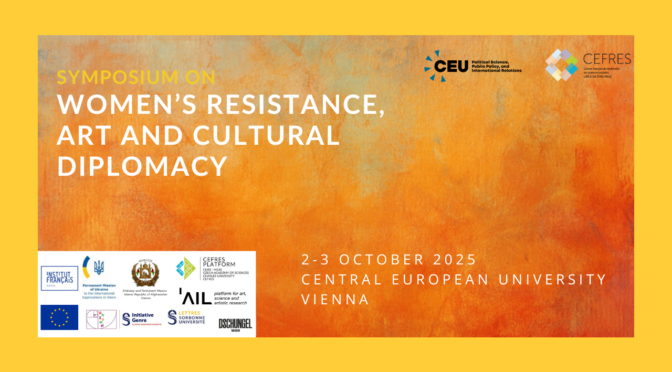
This symposium is jointly organised by the Central European University & The French Research Centre for Social Sciences and Humanities, Prague, (CEFRES).
Date: Octobre 2-3, 2025
Location: CEU Campus, Quellenstrasse 51, Vienna
Language: English
Convenors: Valeriya Korablyova, Louisa Martin-Chevalier & Seema Sridhar
See the program of the event here.
The symposium aims to bring together a variety of perspectives on creative expressions of women’s resistance through art and cultural diplomacy by engaging with academics, activists and conflict-affected artists. The event centres around insights from diplomats; scholars specialising in diverse academic streams on feminist scholarship, creative research methods, musicology; activists working with supporting and promoting exiled artists; and conflict-affected artists living in Europe. Continue reading Women’s Resistance. Art and Cultural Diplomacy →






